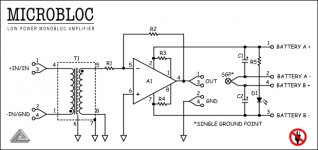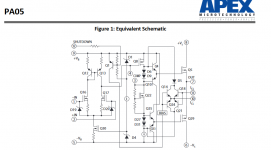speaker said:Has anyone tried them on audio applications?
Haven't tried the high power modes like the PA-05 but I've been using the PA-02 and the PA-16 for quite a few years. I love 'em. They are a bit pricey though.
I first experimented with monolithic power opamps back in the early 90s. Then I tried a hybrid LH-0101 and found it much better than the monolithics I'd tried and haven't gone back to monolithics since. From the LH-0101 I went to the PA-02 and then the PA-16.
se
Re: Pa-02, Pa-16
They're a power opamp so they can be used in most any of the various chip amp/Gainclone circuits. The only additional parts would be the two current sense resistors.
The amps I currently have built are just a simple inverting amp with a gain of 10 (input resistor of 10k and feedback resistor of 100k), 0.12 ohm current sense resistors and a Jensen JT-11P-1 input transformer on the front.
Don't worry about the extra pins I have labled for the intput and output. I use four pin Redel connectors on my stuff so that's why I drew the schematic that way.
se
jasonc said:Steve, could you please post a design?
They're a power opamp so they can be used in most any of the various chip amp/Gainclone circuits. The only additional parts would be the two current sense resistors.
The amps I currently have built are just a simple inverting amp with a gain of 10 (input resistor of 10k and feedback resistor of 100k), 0.12 ohm current sense resistors and a Jensen JT-11P-1 input transformer on the front.
Don't worry about the extra pins I have labled for the intput and output. I use four pin Redel connectors on my stuff so that's why I drew the schematic that way.
se
Attachments
I have actually seen old Beomaster 3000 amp´s using a pair of PA-01 as output stages.
Two 2N3055, one each ch, where replaced with PA01 with the extra holes drilled i sink.
The amp worked as usual, measuring close to 50W RMS at 60V supply rail.
Two 2N3055, one each ch, where replaced with PA01 with the extra holes drilled i sink.
The amp worked as usual, measuring close to 50W RMS at 60V supply rail.
Umm guys, before you get too enthusiastic about these Op Amps, you should know they're mainly for industrial applications such as motor control and position servos.
Take a close look at the open loop gain in the Spec Sheet ... by 20khz they're pretty much spent.
Take a close look at the open loop gain in the Spec Sheet ... by 20khz they're pretty much spent.
They look good to me...100v/us slew rate isn't bad at all.Umm guys, before you get too enthusiastic about these Op Amps, you should know they're mainly for industrial applications such as motor control and position servos.
Take a close look at the open loop gain in the Spec Sheet ... by 20khz they're pretty much spent.
Attachments
Last edited:
Actually, The PA-01 is one of only few of these industrial amps suitable for audio use.
The PA-01 has been around for many years, and a few audio appl. where made when
they came out. The reason that the Beomaster 3000 was of interest, was because that
it was integrated more or less seamlessly (hard to notice, unless following the wiring).
Much more powerful (rectifier and PSU caps replaced) than the original output.
The PA-01 has been around for many years, and a few audio appl. where made when
they came out. The reason that the Beomaster 3000 was of interest, was because that
it was integrated more or less seamlessly (hard to notice, unless following the wiring).
Much more powerful (rectifier and PSU caps replaced) than the original output.
- Home
- Amplifiers
- Chip Amps
- 500 Watt Op Amps from Apex Microtechnology

